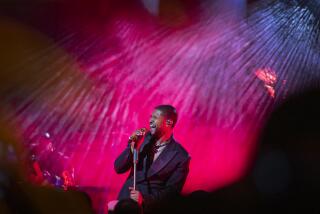Affectionate Appreciation of the Duke
- Share via
When the members of cornetist Bill Berry’s L.A. Big Band gather Sunday at the Irvine Marriott to pay tribute to Duke Ellington, they’ll bring a wealth of Ellington memories and influence to the bandstand.
Pianist Ross Tompkins once hitched a ride with the Ellington band on his way to Newport, R.I.
Trumpeter Conte Candoli sat in with the orchestra during the recording of the soundtrack to the Frank Sinatra vehicle “Assault on a Queen.”
Baritone saxophonist Jack Nimitz remembers watching Ellington saxophonist Paul Gonsalves wander off the bandstand during a Las Vegas performance and continue to play among the audience.
Berry, the Big Band’s leader, recalls meeting Ellington for the first time at New York’s Apollo Theater.
No matter how deep or direct their association with Ellington, all will tell you that the bandleader-composer, who was known for his personal elegance and musical sophistication, continues to influence their careers even now, more than a quarter century after his death in 1974.
“Duke Ellington changed my whole life,” Berry said. “He changed my outlook about everything and not just music.”
Berry, who was a member of the Duke’s orchestra from 1961 through 1963, provides the Big Band’s most direct link to Ellington. He was playing New York City’s famous club Birdland with trumpeter Maynard Ferguson’s band in 1961 when a fan who came in night after night kept saying that he should be playing with Ellington.
“I told him, ‘Yeah, everybody should play with Ellington,’ ” Berry said.
The fan later took Berry to the Apollo to meet Ellington, then revealed himself as Ellington’s public relations manager. Within days, Berry was hired.
“It’s like Clark Terry said: Playing with Count Basie gives you a master’s degree. Playing with Ellington gives you a doctorate. It was the band, and to be part of it was the best thing of all. When I think about playing with [alto saxophonist] Johnny Hodges and [baritone saxophonist] Harry Carney and the others who are legends, it’s ridiculous. They were the greatest.”
Trumpeter Candoli was also asked to go with the Ellington band. He turned them down.
“I had just come out to Los Angeles with the ‘Tonight Show’ band and was doing studio work and I just couldn’t go out on the road. I’ve always been flattered that I was asked and I’ve always regretted I didn’t go.”
The offer came after Candoli was called in to join Ellington’s trumpet section for the recording of the 1966 film “Assault on a Queen.”
“That was the only time I ever worked under Duke’s baton,” he said. “They called in my brother [trumpeter Pete Candoli] and I, added some trombones and some others. Johnny Hodges, Paul Gonsalves and [trumpeter] Cootie Williams were all in the band and I remember Cootie sat between me and my brother and his playing was just magnificent. And Ellington was fabulous as only the Duke can be.”
He recalls seeing the orchestra for the first time at the Roxy Theatre in New York City during the late ‘40s when saxophonist Ben Webster and drummer Sonny Greer were in the band.
“They’d run a feature film between shows and we’d sit through the movie just to catch every performance. Things like that stick in your mind, like going to 52nd Street and seeing all your musical idols in the clubs on one short block.”
Pianist Tompkins had an ongoing job during the ‘60s at The Embers inside New York’s Forest Hotel, where Ellington’s band stayed.
“The drinkers in the band, of which there were plenty, would hang out at the club,” Tompkins recalled.
When he needed to make it to Newport to perform with saxophonist Zoot Sims, he used his connection with Ellington trombonist Buster Cooper to wrangle a ride on the Ellington bus.
“I didn’t want to ride all the way up there in Zoot’s raggedy old Volvo with no muffler,” he said with a laugh. The highlight of the trip? “When we stopped in the Bronx to pick up Johnny Hodges.”
His role as pianist gives Tompkins special insight into the Ellington style. “He played just enough piano to compliment the band,” Tompkins said.
“It was an economical style like Basie’s, only a little more harmonically elaborate. His writing always seemed to be farther out than his playing.”
Tompkins also cites the music’s timelessness, saying that Ellington’s harmonic and stylistic approach remains unsurpassed.
“That’s why it’s great to play those tunes with Bill’s band,” he said. “Bill has some of the original charts. You can see where guys have cleared their valves on them over the years and the ink has run.”
Nimitz, who first saw the band at Disneyland more than 30 years ago, admires the way Ellington framed and tested his soloists.
“Some of the things he wrote for Harry Carney . . . they’re so good and so challenging. I have a friend who knew Carney and he sent me something Duke wrote for him called, fittingly enough, ‘Frustration.’ It’s very hard to play, not something you can look at just once and master.”
Berry sees Ellington’s legacy in his compositions and band-leading style.
“They say that all the big band leaders, Benny Goodman, Harry James--anyone who’s ever led a big band--has followed the model of Fletcher Henderson. Everybody except Ellington. He just always was a total original.”
* Bill Berry and the L.A. Big Band with vocalist Tierney Sutton play a “Tribute To Duke Ellington” at the Irvine Marriott, 1800 Von Karman Ave.; Sunday, 5-9 p.m. $25. (949) 553-9449.
More to Read
Sign up for The Wild
We’ll help you find the best places to hike, bike and run, as well as the perfect silent spots for meditation and yoga.
You may occasionally receive promotional content from the Los Angeles Times.






